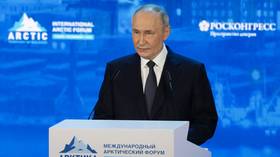Russian voucher privatisation: 15 years on
Fifteen years ago Russia's government was finalising preparations for the most radical privatisation ever seen – to take the post-Soviet economy into the capitalist world.
At that time Russia's economy was in dire straits. It had deteriorated to the point where no funds could be found to import grain. The budget deficit had reached 20% and the state desperately needed money. The shelves in the food-stores were empty, and queues were growing longer and longer.
To bring about economic reform the government embarked on a radical new path – privatisation – under the guidance of young economists Anatoly Chubais and Egor Gaidar. Initially small enterprises were privatised through employee buyouts and public auctions.
Then, all Russian citizens were issued vouchers with a nominal value of about $ US 63 for a purchase of shares in selected state enterprises.
“The Initial idea was just to relocate assets from state to private individuals, private companies, and private owners. And given that at that time it was not enough money accumulated in the country, it was also quite understandable that everything was sold at a very cheap price. If we also take into account the voucher privatisation – it was simply distributed. And it's also quite understandable that in this environment the most entrepreneurial people with market spirits, they benefited a lot. They started buying those vouchers taking certain risks and eventually they benefited from privatisation,” Evgeny Gavrilenkov, Chief Economist from Troika Dialog, says.
Voucher holders could sell their vouchers and many of them did. Others invested in newly established funds. With no previous experience the state did not know how to control these funds, and as a result hundreds were established. Most of them went bankrupt and were closed.
However, voucher privatisation succeeded in transferring 70 % of Russia's large and medium-sized enterprises to private hands to go along with 90 % of small enterprises.
The next phase of the privatisation programme called for direct cash sales of shares in remaining state enterprises. This led to the privatisation of larger enterprises. But a number of corruption scandals tarnished the programme's public image and it gained a negative reputation with ordinary Russians.
“In the public's eyes the privatisation was viewed negatively. People linked it to corrupt transaction, favouritism and crime. But the fact is – without privatisation there would be no market economy as we have it and know it now. Because the main goal of privatisation was to change the structure of the economy by changing the property structure,” Nokolay Vardul, Deputy Editor-in-Chief of Gazeta newspaper, believes.
And that goal was achieved despite misgivings of many ordinary Russians, who came to view the process as a straight grab for assets by a select few.
Despite this, the privatisation process did lay the foundation of a new economic system and saw the rise of a new class of private entrepreneurs. And today 60% of Russia's GDP comes from privately owned businesses.













